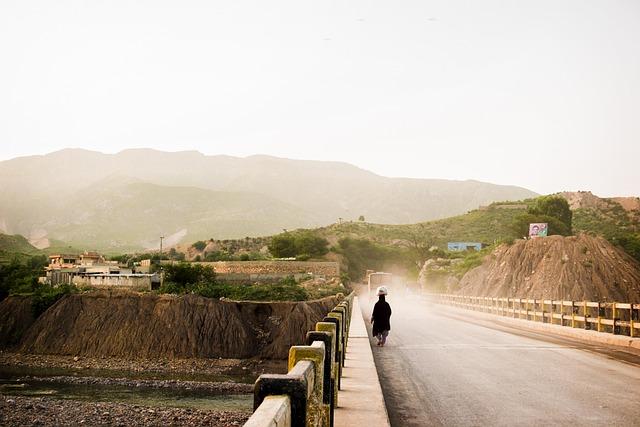In the intricate web of international relations, few countries navigate the complexities of diplomacy and alliances with as much nuance as Pakistan. Bridged between the East and West, it stands at a strategic crossroads, where the ever-evolving dynamics of global politics converge. This article delves into the multifaceted alliances that Pakistan has cultivated over the years, examining how these partnerships not only influence its national interests but also reverberate across regional and global landscapes. From historical ties with neighboring countries to burgeoning relationships with major powers, Pakistan’s strategic alliances are a testament to its efforts to assert itself on the world stage. As we explore the interplay of these relationships, we will uncover the motivations driving Pakistan’s foreign policy and the implications they hold for its role in a rapidly changing international order.
Understanding Pakistans Geopolitical Landscape and Its Alliances
Pakistan’s geopolitical importance is underscored by its pivotal location at the crossroads of South Asia, Central Asia, and the Middle East. This strategic positioning not only influences its relationships with neighboring countries but also impacts global dynamics. Key factors shaping Pakistan’s alliances include:
- Proximity to Major Powers: The presence of countries like India and the ever-evolving relationship with China highlights Pakistan’s diplomatic balancing act.
- Economic Interests: Initiatives such as the China-Pakistan Economic Corridor (CPEC) exemplify how economic considerations drive alliances, enhancing trade and investment.
- Security Concerns: Ongoing tensions with India prompt Pakistan to seek military and strategic partnerships, particularly with nations that share a mutual interest in counterbalancing regional threats.
The country’s alliances are also influenced by historical ties and ideological connections. For example, the long-standing relationship with the United States, rooted in Cold War dynamics, has morphed into a complex partnership that fluctuates based on military, economic, and humanitarian interests. Meanwhile, relations with Islamic countries—especially through organizations like the Organization of Islamic Cooperation (OIC)—further illustrate how cultural solidarity can enhance diplomatic networks. Pakistan’s alliances are characterized by:
| Alliance Type | Key Partners | Primary Focus |
|---|---|---|
| Economic | China, Gulf Countries | Trade & Investment |
| Military | USA, China | Defense & Security |
| Cultural | Saudi Arabia, Turkey | Islamic Unity |

Evaluating the Role of Regional Partnerships in Strengthening Security
Regional partnerships play a crucial role in enhancing security dynamics, particularly for a nation like Pakistan that navigates a complex geopolitical landscape. Collaborations with neighboring countries not only foster mutual trust and cooperation but also enable shared strategies to counter common threats. By participating in multilateral forums and bilateral agreements, Pakistan can strengthen its security apparatus while ensuring a coordinated approach to tackling issues such as terrorism, drug trafficking, and border management. The synergy created through these partnerships empowers Pakistan to leverage collective resources and intelligence, essential for safeguarding national interests.
Strategically, regional alliances help in diversifying Pakistan’s security engagements. These partnerships can be understood through several key dimensions:
- Intelligence Sharing: Enhanced collaboration on intelligence allows for timely responses to security threats.
- Joint Exercises: Conducting joint military exercises with partners improves operational readiness and fosters interoperability.
- Economic Cooperation: Security partnerships often intertwine with economic initiatives, ensuring stability and development.
- Diplomatic Leveraging: Strong regional ties bolster Pakistan’s diplomatic standing on the international stage, enhancing bargaining power.
Moreover, the efforts of Pakistan in forging strategic partnerships can be visualized in the table below which highlights key alliances and their security contributions:
| Partner Country | Type of Cooperation | Key Outcomes |
|---|---|---|
| China | Military & Economic | Joint security initiatives & CPEC |
| Turkey | Defense Collaboration | Joint military training & production |
| Iran | Border Security | Crisis management strategies |
| Russia | Strategic Dialogue | Enhanced military exchanges |

The Economic Dimensions of Pakistans Strategic Collaborations
In recent years, Pakistan has engaged in a series of strategic collaborations that transcend mere geopolitical interests, delving deep into the economic landscape. These partnerships are designed not only to bolster the defense capabilities of the nation but also to stimulate economic growth through shared resources and technology transfers. Key economic benefits emanating from these collaborations include:
- Increased Trade Volume: Bilateral agreements often lead to enhanced trade, offering new markets for Pakistani products.
- Investment Opportunities: Strategic partnerships attract foreign direct investment (FDI), fueling local industries and generating employment.
- Infrastructure Development: Collaborations frequently result in significant infrastructure projects, improving connectivity and logistics.
Furthermore, the impact of these alliances extends to multilateral platforms, where Pakistan positions itself as a vital player. Countries such as China and Turkey have been instrumental in this regard, providing frameworks for economic cooperation that are mutually beneficial. Examples of notable initiatives reflecting this trend include:
| Initiative | Partner Country | Focus Area |
|---|---|---|
| China-Pakistan Economic Corridor (CPEC) | China | Infrastructure & Energy |
| Turkey-Pakistan Free Trade Agreement | Turkey | Trade & Investment |
| Pakistan-Russia Economic Ties | Russia | Energy Sector |

Recommendations for Enhancing Pakistans Diplomatic Engagements
To bolster Pakistan’s diplomatic engagements, it is essential to adopt a multifaceted approach that emphasizes active participation in international organizations and regional partnerships. Strengthening ties with key regional players will create a more cohesive strategy for addressing common challenges such as trade, security, and climate change. This could involve:
- Increasing participation in regional forums like SAARC and the Shanghai Cooperation Organization.
- Facilitating dialogue through backchannels to resolve bilateral tensions with neighboring countries.
- Establishing economic corridors to foster trade relationships with Central Asia and the Middle East.
Moreover, enhancing public diplomacy initiatives can significantly improve Pakistan’s international image and influence. Emphasizing cultural exchanges and educational partnerships fosters mutual understanding and respect. Key strategies may include:
- Launching international scholarship programs for foreign students in Pakistani universities.
- Promoting Pakistani art, music, and cuisine at global festivals.
- Utilizing social media platforms to engage with diaspora communities for advocacy and outreach.
| Strategy | Objective |
|---|---|
| Regional Cooperation | Strengthen ties with neighboring countries |
| Economic Corridors | Enhance trade relationships |
| Public Diplomacy | Improve international image |
| Cultural Exchanges | Foster mutual understanding |
In Retrospect
In a world where geopolitical landscapes are constantly shifting, Pakistan’s strategic alliances serve as a compelling narrative of adaptability and foresight. As the nation navigates the complexities of international relations, its partnerships echo a blend of historical ties, economic aspirations, and security considerations.
From the West to the East, each alliance is a thread woven into the broader tapestry of global diplomacy, illustrating the nuanced dance of power, influence, and mutual interests. As we reflect on Pakistan’s role in shaping these alliances, it becomes evident that the future is not solely dictated by past engagements but also by an ever-evolving understanding of global dynamics.
As the nation steps into a new era, it will undoubtedly face both challenges and opportunities that require agility and innovation. The path forward is not predetermined but rather a canvas awaiting the strokes of diplomacy, collaboration, and vision. In this intricate web of international relations, Pakistan stands poised to play a pivotal role, reminding us that alliances are not just strategic—they are the bridges that connect diverse nations, cultures, and ideas towards a common horizon.
As we observe this unfolding narrative, one thing remains clear: the story of Pakistan’s strategic alliances is far from over. It is a saga of resilience in the face of uncertainty, a testament to the enduring quest for partnership in a complex world, and an invitation to consider how nations can work together to forge a brighter, more interconnected future.



